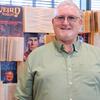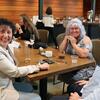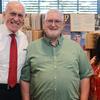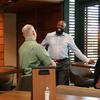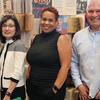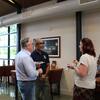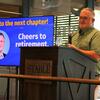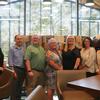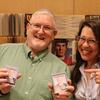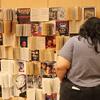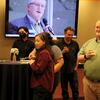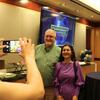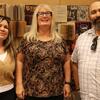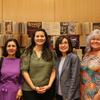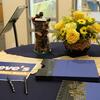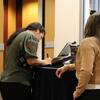Search
Search
Support for Digital Scholarship
What is “Digital Scholarship”?
Digital scholarship is generally understood as the use of digital tools or methods for scholarly activities like research, teaching, and publishing.
The phrase “digital scholarship” can describe both the process of creating new, often fluid forms of scholarship using digital tools and computational methods, as well as the ever-evolving products of technology-dependent research. Digital scholarship is intensely collaborative, iterative, public-facing, interdisciplinary, community-engaged, and open.
Writers Week: Meet the Authors
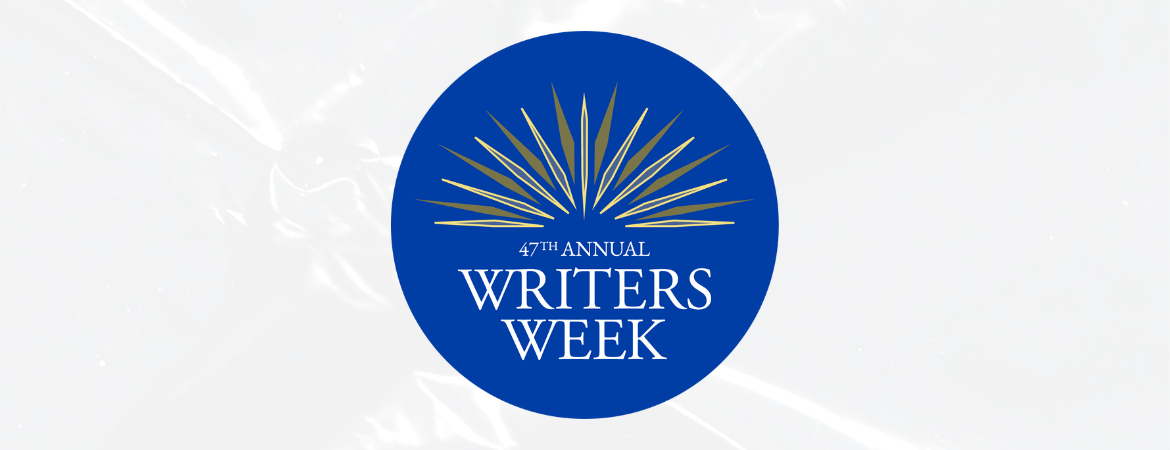
Learn about some of the authors featured in the UCR Library's Writers Week exhibit. View the exhibit in the Tomás Rivera Library until February 16.
This year's Writers Week is taking place February 10 and February 12 - 16. See all the events (most are hybrid) and RSVP at writersweek.ucr.edu.
Learn more about our Writers Week exhibit here and more about the authors featured below.
Prageeta Sharma is a poet born in Framingham, Massachusetts. Her collections of poetry include Bliss to Fill, The Opening Question, which won the Fence Modern Poets Prize, Infamous Landscapes, Undergloom, and Grief Sequence.
Noah Amir Arjomand is a filmmaker currently enrolled in the MFA Writing for the Performing Arts program at UCR, where he is a chancellor's distinguished fellow in screenwriting. He is the author of Fixing Stories: Local Newsmaking and International Media in Turkey and Syria and co-directed and co-produced the feature-length documentary Eat Your Catfish about my mother's life with ALS.
Vickie Vértiz was born and raised in Bell Gardens, a city in southeast Los Angeles County. With over 25 years of experience in social justice, writing, and education. Her writing is featured in the New York Times Magazine, the San Francisco Chronicle, Huizache, Nepantla, the Los Angeles Review of Books, among many others.
Cati Porter is the recipient of an Individual Artist Fellowship from the California Arts Council for 2023-24. Additionally, Cati Porter’s poetry has won or been a finalist in contests by: So To Speak, judged by Arielle Greenberg; Crab Creek Review, judged by Aimee Nezhukumatathil; and Gravity & Light, judged by Chella Courington. Cati Porter lives in Inland Southern California where she runs her Poemeleon: A Journal of Poetry and directs Inlandia Institute, a 501(c)(3) literary nonprofit.
Issam Zineh is a Palestinian-American poet and scientist. He is author of Unceded Land (Trio House Press, 2022), finalist for the Trio Award, Medal Provocateur, Housatonic Book Award, and Balcones Prize for Poetry, and the chapbook The Moment of Greatest Alienation (Ethel Press, 2021). His poems appear or are forthcoming in AGNI, Guernica, Gulf Coast, Pleiades, Tahoma Literary Review, The Rumpus, and elsewhere.
Melissa Studdard is the author of five books, including the poetry collections Dear Selection Committee. Her work has been featured by NPR, PBS, The New York Times, The Guardian, Ms. Magazine, and Houston Matters, and more.
Minda Honey is the editor of Black Joy at Reckon, a newsletter has nearly 60K subscribers. Her essays on politics and relationships have appeared in Harper’s Baazar, the Los Angeles Review of Books, the Washington Post, the Guardian, the Oxford American, Teen Vogue, and Longreads.
Daisy Ocampo Diaz (Caxcan, or Caz’ Ahmo, Indigenous Nation of Zacatecas, Mexico) earned her PhD in History from the University of California, Riverside in 2019. Her research in Native and Public History informs her work with museum exhibits, historical preservation projects, and community-based archives.
Elena Karina Byrne is a screenwriter, essayist, reviewer, multi-media artist, and editor. She is The Los Angeles Times Festival of Books Programming Consultant & Poetry Stage Manager and Literary Programs Director for the historic The Ruskin Art Club. She is the author of five poetry collections.
Farnaz Fatemi is an Iranian American writer and editor in Santa Cruz, California. Her debut book, Sister Tongue زبان خواهر , was published in September 2022. It won the 2021 Stan and Tom Wick Poetry Prize, selected by Tracy K. Smith, from Kent State University Press, and received a Starred Review from Publisher’s Weekly.
Lisa Teasley is a graduate of UCLA and a native of Los Angeles. Her critically acclaimed debut, Glow in the Dark, is winner of the Gold Pen Award and Pacificus Literary Foundation awards for fiction. She has also won the May Merrill Miller and the National Society of Arts & Letters Short Story awards. Teasley has a new story collection, Fluid, which was released on Cune Press, September 26, 2023.
Quincy Troupe is an awarding-winning author of 12 volumes of poetry, three children’s books, and six non-fiction works. In 2010 Troupe received the American Book Award for Lifetime Literary Achievement. Quincy Troupe is professor emeritus of the University of California, San Diego, formerly editor Code magazine and Black Renaissance Noire, a literary journal of the Institute of Africana Studies at New York University, and poetry editor of A Gathering of the Tribes online magazine.
Reza Aslan is s a renowned writer, commentator, professor, Emmy- and Peabody-nominated producer, and scholar of religions. A recipient of the prestigious James Joyce award, Aslan is the author of three internationally best-selling books, including the #1 New York Times Bestseller, Zealot: The Life and Times of Jesus of Nazareth. Aslan is Distinguished Professor of Creative Writing at the University of California, Riverside and serves on the board of trustees for the Chicago Theological Seminary and The Yale Humanist Community.
Rigoberto González earned a degree in humanities and social sciences interdisciplinary studies from the University of California, Riverside, and an MFA from Arizona State University in Tempe. González is the author of five poetry collections, including The Book of Ruin (Four Way Books, 2019); Unpeopled Eden (Four Way Books, 2013), winner of the Lambda Literary Award and the 2014 Lenore Marshall Poetry Prize from the Academy of American Poets.
Donato Martinez teaches English Composition, Literature, and Creative Writing at Santa Ana College. His first full collection of poetry, Touch the Sky, was published in June by El Martillo Press.
Jason Magabo Perez holds an MFA in writing and consciousness from New College of California, formerly in San Francisco, and a dual PhD in ethnic studies and communication from the University of California, San Diego. Perez is the author of I ask about what falls away, forthcoming in 2024; This is for the mostless (WordTech Editions, 2017); and Phenomenology of Superhero (Red Bird Chapbooks, 2016).
Dave Eggers is the author of many books, among them The Eyes and the Impossible, The Circle, The Monk of Mokha, Heroes of the Frontier, A Hologram for the King, and What Is the What. He is the founder of McSweeney’s, an independent publishing company, and a member of the American Academy of Arts and Letters.
Kimberly Blaeser, writer, photographer, and scholar, is a past Wisconsin Poet Laureate. She is the author of five poetry collections, most recently the bi-lingual Résister en dansant/Ikwe-niimi: Dancing Resistance (2020), Copper Yearning (2019), and Apprenticed to Justice.
Marsha de la O was born and raised in Southern California. She earned her MFA from Vermont College and is the author of two collections of poetry: Black Hope (1997), winner of the New Issues Poetry Prize, and Antidote for Night (2015), winner of the Isabella Gardner Prize from BOA Editions.
Cindy Juyoung Ok is a poet, former high school physics teacher, and university creative writing instructor. Her collection of poems, Ward Toward, won the Yale Younger Poets Prize.
Making Archives Modern: Spotlight on Eric Milenkiewicz
The Society of California Archivists (SCA) recently elected UCR Library’s Eric Milenkiewicz as Vice President / President Elect.
Formed in 1971, SCA is a professional association devoted to the support and development of individuals and institutions that collect, care for, and provide access to the documentary heritage of California and adjoining areas.
As the VP / President Elect, Milenkiewicz will have a hand in the programming for the SCA’s 2019 Annual General Meeting, which draws several hundred archivists from across the state. He will also be involved in planning the 2020 Western Roundup in San Francisco, where attendees from four regional archivist associations in the west converge.
Milenkiewicz first started working in the library as a student employee. After graduation (class of 1999), and while earning his MLIS degree from San Jose State, he worked in a variety of positions, mostly in Special Collections & University Archives.
His current role as Digitization Services Program Manager complements his primary passion in library work, archives. With his knowledge of digitization, he sees serving as the VP / President Elect of SCA as an opportunity to get the archival community thinking differently about how they work.
“Today’s archivists possess skillsets that can be applied to many other areas of the library, and even to other industries,” Milenkiewicz said. “In addition to the traditional archival work, many of us code, work with advanced imaging equipment, and manage digital assets. These technical skills can open up many other avenues and job opportunities for us.”
He added, “Much of the information we interact with today is in digital form, but a lot of historical information is still only available in print. Taking this material and digitizing it opens it up to a whole new audience that probably didn’t even know it existed.”
Milenkiewicz values how new technologies can empower underrepresented communities to create and maintain their own digital archives. In 2017, he wrote a grant proposal which was funded by the Andrew W. Mellon Foundation that enabled the UCR Library to work with the Sherman Indian Museum to digitize their collections.
“Honestly, looking back on my career thus far, that’s probably my greatest accomplishment,” he explained. “The Museum receives virtually zero funding and has operated for more than 40 years primarily as a result of the passionate volunteers in their community. They needed funds to help preserve their collection and thankfully we received the financial support to do that digitally.”
Milenkiewicz was initially drawn to archives because of his passion for history. “What I find most fulfilling is being able to surface hidden or untold stories so that people can learn their history, learn their culture,” he explained. “Now, instead of merely trying to provide access to the physical materials, it’s also about digitizing it. Making sure this material is preserved, it’s safeguarded, it’s accessible for people to find and use.”
How Do I Find - Government Information
The UCR Library serves as a Federal Depository, holding local, state of California and United States federal government information.
Physical materials are located on the first floor of Rivera Library.
Alertus Installed on Library Computer Workstations
Recently, Alertus Desktop Notification was installed on all library computer workstations.
This software is meant to notify UC Riverside library users of on-campus emergency or threat issues.
What is Alertus?
The application functions as an alerting system for staff, students, and patrons that use library computer workstations. Alertus Emergency Notification System works in conjunction with a High Powered Speaker Arrays (HPSA) at the BellTower, as well as a Desktop Client.
What does it do?
- The Alertus Desktop Alert client program simply pops up a full-screen window, on top of any other computer programs currently running.
- There should be no expectation of performance impact for any other running processes.
- For example: An instructor playing a DVD would have his or her playback visually interrupted by the pop up alert message, but after acknowledging the message their program should be in the same state as before the message appeared.
How does it work?
- The Desktop Alert takes up the entire screen when activated and a Text to Speech message will also play aloud.
- Users can dismiss the alert manually; otherwise, the alerts disappear when a dispatcher cancels the alert.
- If a user logs in after an alert has been canceled, they should not see any past alerts.
Who puts out the warnings?
Enterprise Risk Management in collaboration with the UCR Police Department puts out the warnings.
Library to host Open Access Week 2021
The University of California, Riverside Library will host Open Access Week 2021, as part of the global event called International Open Access Week.
“It Matters How We Open Knowledge: Building Structural Equity" is the 2021 theme. The event series will kick off on Monday, Oct. 25, with three workshops for the 2021 event.
- Data Publishing Made Easy with Dryad: Oct. 25 at 11 a.m. - 12 p.m.
- Copyright for Graduate Students and Academic Authors: Oct. 25 at 2 - 3 p.m.
- QGIS: Building Skills with Vector Data: Nov. 2 at 2 - 3 p.m.
Open Access Week is an opportunity for the academic and research community to learn about the potential benefits of sharing what they’ve learned with colleagues, and to help inspire wider participation in helping to make “open access” a new norm in scholarship, research and data planning and preservation. The Open Access movement is made of up advocates (librarians, researchers, publishers, etc.) who promote the free, immediate, and online publication of research.
This will be the eleventh International Open Access Week program hosted by the UCR Library. The Open Access Week workshops are free and open to the public.
Library blogs highlight our work
On occasion, UCR Library employees document their work through a blog.
Using blogs as a communication tool for the library allows insight into the behind-the-scenes processes that library patrons don't usually get to see. Blogs also make it possible to highlight new discoveries of important or interesting content in our collections as we identify it.
Collections Management Librarian Jessica Geiser kept a detailed record of her progress while working on the George Brown political papers, before that collection was made available to the public in 2016.
Similarly, the Jay Kay and Doris Klein Librarian for Science Fiction, JJ Jacobson and graduate student Miranda Butler, her co-curator for the "200 Years of Frankenstein" exhibit scheduled to debut in fall 2018, are currently documenting their exhibit-design journey on the Frankenblog.
Those interested in learning more can read other UCR Library blogs here.
UCR Library Building Updates: Fall 2024
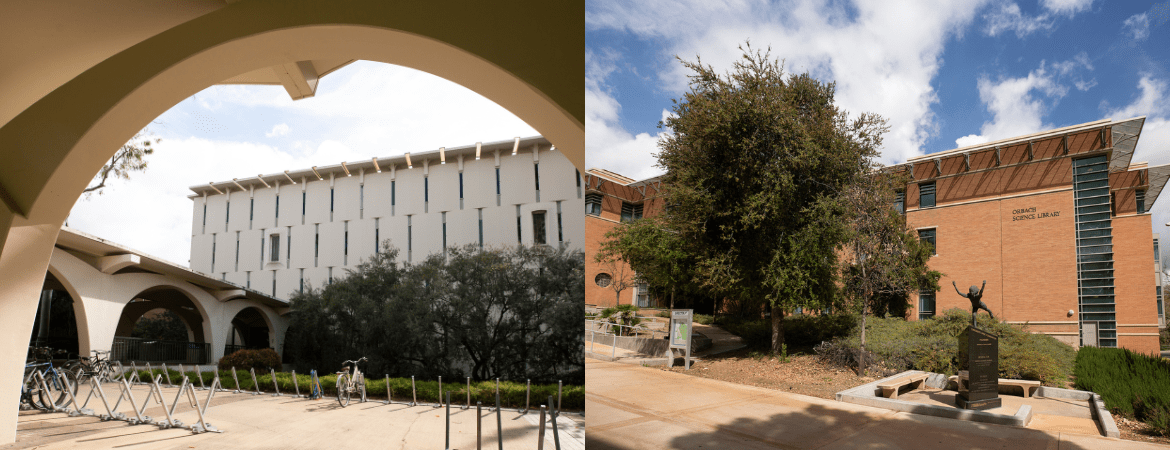
We’re excited to share the latest updates on ongoing projects at the UCR Library!
Both Rivera and Orbach Libraries are undergoing important renovations to improve our spaces for your study and research needs.
Tomás Rivera Library
- Special Collections & University Archives has reopened. You can visit Monday through Friday, from 10 a.m. to 4 p.m. on the 4th floor.
- The basement reopened in the afternoon on Monday, September 30.
- Our group study rooms are getting a mini makeover—stay tuned for more exciting details!
- Work continues on our HVAC system upgrade. We expect the project to be done by the end of the year.
Orbach Library
- Our full roof replacement project is underway. The 3rd floor will only be open to authorized personnel. We anticipate reopening the 3rd floor to everyone by the end of Winter Quarter 2025, when the project is complete. In the meantime, study spaces and public computers are available on the 1st and 2nd floors.
We appreciate your patience as we work to improve our facilities and look forward to welcoming you back to these refreshed spaces!
